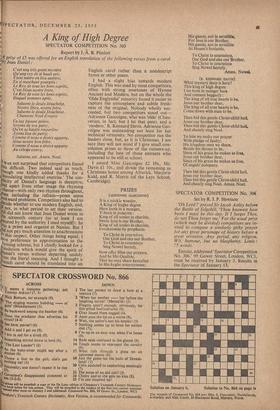A King of High Degree
1 by prize of £5 was* oilered for an English translation of the following verses from a carol oy lean Daniel : G'est wig ties grant mystere Qu'ung roy de si haul! pris Vient naitre en lieu austere, Isn si meschant pourpris : Le Roy de sous les bons esprit:, C'est Jesus nostre frere, Le Roy de tousles bons esprit:, Duque! sommes apris.
Saluons le doulx Jesuchrist, Nostre Dieu, nostre frere, Saluons le doulx Jesuchrist, Chantons Noel d'esprit.
En lily faisant priere, Soyons de son party, • Qu'en sa Waite entperiere Ayons lieu de party; Comme it nous a droict appw'ly, Jesus nostre bon frere, Comme it noun a droict appall)* Au celesste con try.
Saluons, etc. Amen. Noel.
1
, As not surprised that competitors found !his difficult. Two indeed said as much, hough one kindly added thanks for a '1!Inulating intellectual exercise.' The sim- Acity of Daniel's language is deceptive, Itld apart from other snags the rhyming (leheme—with only two rhymes throughout, Oen including the refrain—poses some wkward problems. Competitors also had to ,eeide whether to use modern English, and, f! not, in what period to set their version. ,7.11 did not know that Jean Daniel wrote in sixteenth century (so at least I am %sured by the authority I used myself): he 'as a priest and organist at Nantes. But I s Id not pay much attention to anachronisms II this respect. Other things being equal, I aye preference to approximation to the .,r '45Thing scheme, but I chiefly looked for a Tsanslation which would give the spirit of aniel's verses without departing unduly Pm the literal meaning. And I thought a 'Tench carol should be translated into an
English carol rather than a nondescript hymn or other poem.
I had a slight bias towards modern English. This was used by most competitors, often with strong overtones of Hymns Ancient and Modern, but on the whole the 'Olde Englysshe' minority found it easier to capture the atmosphere and subtle fresh- ness of the original, Nobody wholly suc- ceeded, but two competitors stood out— Adrienne Gascoigne, who was 'olde' (Chau- cerian, in fact, but 1 let that pass), and a 'modern,' R. Kennard Davis. Adrienne Gas- coigne was outstanding not least for her technical virtuosity. No competitor ran the leaders close, hut, as it is Christmas, I am sure they will not mind if I give small con- solation prizes to three of the runners-up, including the best of those entrants who appeared to be still at school.
I award Miss and £2 10s., Mr.
Davis £1 10s., and divide the remaining as Christmas boxes among Alberick, Marjorie Kidd, and R. Morris (of the Leys School, Cambridge).
PRIZES
(ADR1ENN GASCOIGNO
It is a mickle wonder, A King of hyghe degree Here lyeth in a manger, Y-born in pouertie : King of all soules in charitie, Swete Jesu is our Brother, King of all soules in charitie, Foreknowne by prophecie.
To Christ in courteisye, Our God and eke our Brother, To Christ in courteisye Sing Nowel hertely.
Now offer Him our praycre, And be His Qualitie.
That we may share hereafter In His hyghe souereynetee; His guests, not in seruilitie, For Jesu is our Brother, His guests, not in seruilitie At Heuen's festiuitie.
To Christ in courteisye, Our God and eke our Brother, To Christ in courteisye Sing Nowel hertely. Amen. Nowel.
(t. KENNARD DAVIS) .What mystery deep is here? This king of high degree l.ies born in manger bare And raiment beggarly : The king of all true hearts is he, Jesus our brother dear, The king of all true hearts is he, Come down with man to be.
Then bid this gentle Christ-child hail, Jesus our brother dear, Then hid this gentle Christ-child hail, And chcerly sing Noel.
To him we make our prayer With pledge of fealty; His kingdom may we share, Beside his throne to be, Since of his grace he makes us free, Jesus our brother dear, Since of his grace he makes us free, Of angels company.
Then bid this gentle Christ-child hail, Jesus our brother dear, Then bid this gentle Christ-child hail, And cheerly sing Noel. Amen. Noel.


































 Previous page
Previous page